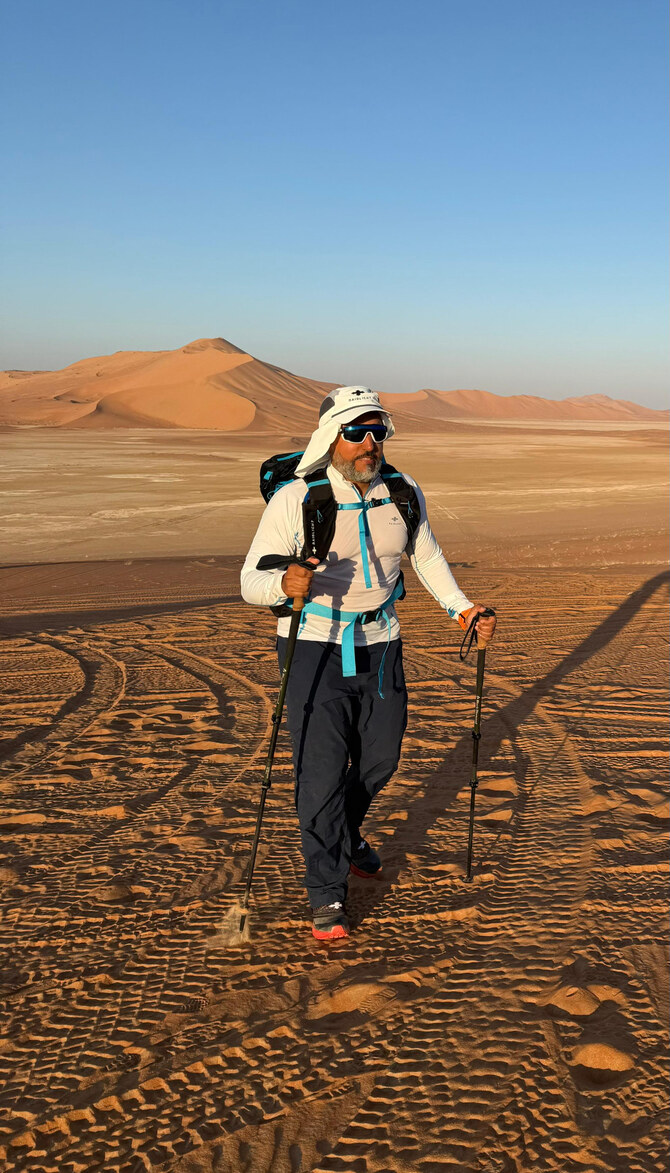JEDDAH: Badr Al-Shaibani, a Saudi Arabia adventurer and entrepreneur, has successfully completed a 600 km solo crossing of the largest sand desert in the world.
Al-Shaibani departed from Umm Hadid on Dec. 15, the site of a famous meteorite impact, where he set up his first camp. He walked for over 14 days and completed the journey on Dec. 29 at the breathtaking Umm Al-Hayesh Lake — one of the Empty Quarter’s natural wonders.
Speaking to Arab News after completing his adventure, 45-year-old Al-Shaibani said: “Crossing the Empty Quarter on foot is one of the most thrilling adventures I have ever done. It is a really special experience.

Speaking of challenges he faced, Al-Shaibani said: “The first two days, I faced strong storms and winds called savi, and after a while the sun was also strong. (Supplied)
“I am so proud to be the first Saudi to traverse such a vast distance on foot, and I hope this journey inspires young Saudis to explore the nature of our country and spotlight Saudi Arabia’s diverse potential as a truly unique global tourist destination.”
His journey began by heading toward Tawil Al-Khatam, a challenging 200 km stretch that he traversed in five days at an average pace of 40 km per day.
Later on, Al-Shaibani continued toward Umm Al-Qurun, covering 90 km, before completing another 45 km to Bayd Al-Laha.
Being alone in the darkness, you explore something you wouldn’t normally see during your life. It was an amazing scene which makes you wonder how Allah created this part of the world.
Badr Al-Shaibani, Saudi adventurer
The third and final leg led him to the Al-Qa’d region near the Sabkha salt flats through a 60 km route. His expedition concluded at the breathtaking Umm Al-Hayesh Lake after trekking an additional 160 km.
From battling the weather to navigating endless dunes, this adventure pushed Al-Shaibani to the limit both physically and mentally. “I discovered the beauty and harshness of the Empty Quarter’s untamed wilderness, where there is a constant challenge, but the rewards are incredible.”
Speaking of challenges he faced, he said: “The first two days, I faced strong storms and winds called savi, and after a while the sun was also strong. Other than that, I am used to walking on ice or climbing mountains, but walking and climbing the soft sand was a big challenge for me. I really faced difficulty climbing the sand because it takes a lot of effort.”
Being so far from civilization exposed him to new experiences. “During the day I could see with my eyes. During the night, the exploration changes,” he said.
“Being alone in the darkness, you explore something you wouldn’t normally see during your life, it was an amazing scene which makes you wonder how Allah created this part of the world.”
He was happy to complete the adventure not only to add it to his achievements but also to document and capture the majestic beauty of the largest continuous sand desert in the world.
“The Empty Quarter, with its distinctive natural heritage and captivating beauty, stands as one of the Kingdom’s most remarkable yet largely undiscovered treasures,” he said.
“This destination has the potential to become a major attraction for tourists from home and abroad, especially with initiatives that promote desert tourism and encourage the exploration of the Kingdom’s unique natural environment.”
Al-Shaibani told Arab News he wants to inspire young people and champion Saudi Arabia as a land where heritage, nature and adventure converge.






























